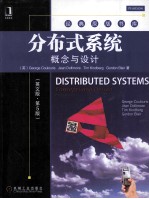图书介绍
分布式系统概念与设计 英文版 第5版【2025|PDF|Epub|mobi|kindle电子书版本百度云盘下载】

- (英)库鲁里斯著 著
- 出版社: 北京:机械工业出版社
- ISBN:9787111397724
- 出版时间:2012
- 标注页数:989页
- 文件大小:88MB
- 文件页数:1006页
- 主题词:分布式操作系统-英文
PDF下载
下载说明
分布式系统概念与设计 英文版 第5版PDF格式电子书版下载
下载的文件为RAR压缩包。需要使用解压软件进行解压得到PDF格式图书。建议使用BT下载工具Free Download Manager进行下载,简称FDM(免费,没有广告,支持多平台)。本站资源全部打包为BT种子。所以需要使用专业的BT下载软件进行下载。如BitComet qBittorrent uTorrent等BT下载工具。迅雷目前由于本站不是热门资源。不推荐使用!后期资源热门了。安装了迅雷也可以迅雷进行下载!
(文件页数 要大于 标注页数,上中下等多册电子书除外)
注意:本站所有压缩包均有解压码: 点击下载压缩包解压工具
图书目录
1 CHARACTERIZATION OF DISTRIBUTED SYSTEMS1
1.1 Introduction2
1.2 Examples of distributed systems3
1.3 Trends in distributed systems8
1.4 Focus on resource sharing14
1.5 Challenges16
1.6 Case study:The World Wide Web26
1.7 Summary33
2 SYSTEM MODELS37
2.1 Introduction38
2.2 Physical models39
2.3 Architectural models40
2.4 Fundamental models61
2.5 Summary76
3 NETWORKING AND INTERNETWORKING81
3.1 Introduction82
3.2 Types of network86
3.3 Network principles89
3.4 Internet protocols106
3.5 Case studies:Ethernet,WiFi and Bluetooth128
3.6 Summary141
4 INTERPROCESS COMMUNICATION145
4.1 Introduction146
4.2 The API for the Internet protocols147
4.3 External data representation and marshalling158
4.4 Multicast communication169
4.5 Network virtualization:Overlay networks174
4.6 Case study:MPI178
4.7 Summary181
5 REMOTE INVOCATION185
5.1 Introduction186
5.2 Request-reply protocols187
5.3 Remote procedure call195
5.4 Remote method invocation204
5.5 Case study:Java RMI217
5.6 Summary225
6 INDIRECT COMMUNICATION229
6.1 Introduction230
6.2 Group communication232
6.3 Publish-subscribe systems242
6.4 Message queues254
6.5 Shared memory approaches262
6.6 Summary274
7 OPERATING SYSTEM SUPPORT279
7.1 Introduction280
7.2 The operating system layer281
7.3 Protection284
7.4 Processes and threads286
7.5 Communication and invocation303
7.6 Operating system architecture314
7.7 Virtualization at the operating system level318
7.8 Summary331
8 DISTRIBUTED OBJECTS AND COMPONENTS335
8.1 Introduction336
8.2 Distributed objects337
8.3 Case study:CORBA340
8.4 From objects to components358
8.5 Case studies:Enterprise JavaBeans and Fractal364
8.6 Summary378
9 WEB SERVICES381
9.1 Introduction382
9.2 Web services384
9.3 Service descriptions and IDL for web services400
9.4 A directory service for use with web services404
9.5 XML security406
9.6 Coordination of web services411
9.7 Applications of web services413
9.8 Summary419
10 PEER-TO-PEER SYSTEMS423
10.1 Introduction424
10.2 Napster and its legacy428
10.3 Peer-to-peer middleware430
10.4 Routing overlays433
10.5 Overlay case studies:Pastry,Tapestry436
10.6 Application case studies:Squirrel,OceanStore,Ivy449
10.7 Summary458
11 SECURITY463
11.1 Introduction464
11.2 Overview of security techniques472
11.3 Cryptographic algorithms484
11.4 Digital signatures493
11.5 Cryptography pragmatics500
11.6 Case studies:Needham-Schroeder,Kerberos,TLS,802.11 WiFi503
11.7 Summary518
12 DISTRIBUTED FILE SYSTEMS521
12.1 Introduction522
12.2 File service architecture530
12.3 Case study:Sun Network File System536
12.4 Case study:The Andrew File System548
12.5 Enhancements and further developments557
12.6 Summary563
13 NAME SERVICES565
13.1 Introduction566
13.2 Name services and the Domain Name System569
13.3 Directory services584
13.4 Case study:The Global Name Service585
13.5 Case study:The X.500 Directory Service588
13.6 Summary592
14 TIME AND GLOBAL STATES595
14.1 Introduction596
14.2 Clocks,events and process states597
14.3 Synchronizing physical clocks599
14.4 Logical time and logical clocks607
14.5 Global states610
14.6 Distributed debugging619
14.7 Summary626
15 COORDINATION AND AGREEMENT629
15.1 Introduction630
15.2 Distributed mutual exclusion633
15.3 Elections641
15.4 Coordination and agreement in group communication646
15.5 Consensus and related problems659
15.6 Summary671
16 TRANSACTIONS AND CONCURRENCY CONTROL675
16.1 Introduction676
16.2 Transactions679
16.3 Nested transactions690
16.4 Locks692
16.5 Optimistic concurrency control707
16.6 Timestamp ordering711
16.7 Comparison of methods for concurrency control718
16.8 Summary720
17 DISTRIBUTED TRANSACTIONS727
17.1 Introduction728
17.2 Flat and nested distributed transactions728
17.3 Atomic commit protocols731
17.4 Concurrency control in distributed transactions740
17.5 Distributed deadlocks743
17.6 Transaction recovery751
17.7 Summary761
18 REPLICATION765
18.1 Introduction766
18.2 System model and the role of group communication768
18.3 Fault-tolerant services775
18.4 Case studies of highly available services:The gossip architecture,Bayou and Coda782
18.5 Transactions with replicated data802
18.6 Summary814
19 MOBILE AND UBIQUITOUS COMPUTING817
19.1 Introduction818
19.2 Association827
19.3 Interoperation835
19.4 Sensing and context awareness844
19.5 Security and privacy857
19.6 Adaptation866
19.7 Case study:Cooltown871
19.8 Summary878
20 DISTRIBUTED MULTIMEDIA SYSTEMS881
20.1 Introduction882
20.2 Characteristics of multimedia data886
20.3 Quality of service management887
20.4 Resource management897
20.5 Stream adaptation899
20.6 Case studies:Tiger,BitTorrent and End System Multicast901
20.7 Summary913
21 DESIGNING DISTRIBUTED SYSTEMS:GOOGLE CASE STUDY915
21.1 Introduction916
21.2 Introducing the case study:Google917
21.3 Overall architecture and design philosophy922
21.4 Underlying communication paradigms928
21.5 Data storage and coordination services935
21.6 Distributed computation services956
21.7 Summary964
REFERENCES?967
INDEX967
热门推荐
- 3588791.html
- 3250108.html
- 364112.html
- 641605.html
- 1594521.html
- 874424.html
- 2293266.html
- 2582418.html
- 1413272.html
- 3183668.html
- http://www.ickdjs.cc/book_1010402.html
- http://www.ickdjs.cc/book_141338.html
- http://www.ickdjs.cc/book_1907345.html
- http://www.ickdjs.cc/book_114008.html
- http://www.ickdjs.cc/book_630035.html
- http://www.ickdjs.cc/book_1713864.html
- http://www.ickdjs.cc/book_1316294.html
- http://www.ickdjs.cc/book_2176980.html
- http://www.ickdjs.cc/book_830243.html
- http://www.ickdjs.cc/book_2911934.html